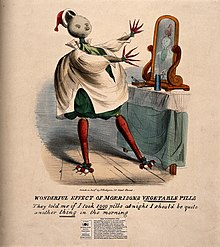Complementary medicine
| Alternative medicine | |
|---|---|
| complimentary & alternative medicine (CAM), complementary medicine, heterodox medicine, integrative medicine, new-age medicine, unconventional medicine, unorthodox medicine | |

"They told me if I took 1000 pills at night I should be quite another thing in the morning", an early 19th-century satire on Morison's Vegetable Pills, an alternative medicine supplement.
|
Alternative medicine or fringe medicine are practices claimed to have the healing effects of medicine but which are disproven, unproven, or impossible to prove, or are excessively harmful in relation to their effect; and where the scientific consensus is that the therapy does not, or can not, work because the known laws of nature are violated by its basic claims; or where it is considered so much worse than conventional treatment that it would be unethical to offer as treatment. Alternative therapies or diagnoses are not part of medicine or science-based healthcare systems. Alternative medicine consists of a wide variety of practices, products, and therapies—ranging from those that are biologically plausible but not well tested, to those with known harmful and toxic effects. Contrary to popular belief, significant expense is paid to test alternative medicine, including over $2.5 billion spent by the United States government. Almost none show any effect beyond that of false treatment. Perceived effects of alternative medicine may be caused by placebo; decreased effect of functional treatment (and therefore potentially decreased side effects); and regression toward the mean where improvement that would have occurred anyway is credited to alternative therapies; or any combination of the above. Alternative treatments are neither the same as experimental medicine, nor traditional medicine — although the latter, when used today may be considered alternative.
Alternative medicine has grown in popularity and is used by a significant percentage of the population in many countries. While it has extensively rebranded itself: from quackery to complementary or integrative medicine—it promotes essentially the same practices. Newer proponents often suggest alternative medicine be used together with functional medical treatment, in a belief that it "complements" (improves the effect of, or mitigates the side effects of) the treatment. There is no evidence showing they do so, and significant drug interactions caused by alternative therapies may instead negatively influence treatments, making them less effective, notably cancer therapy. Despite being illegal to market alternative therapies for cancer treatment in most of the developed world, many cancer patients use them.
...
Wikipedia
